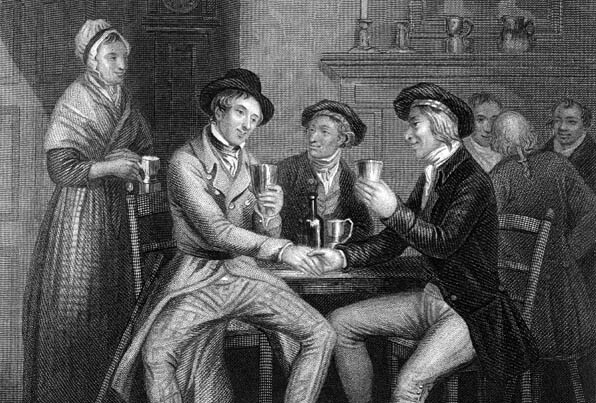2015: Another 'Long Time Past'

In 2009 and 2011, on a similar late December evening, I wrote about the words and music that once (perhaps still) sum up the ending of the year. Here, with additions for 2015, are some thoughts on "long time past."
I'm no hyphenate. It would be an impertinence and a form of dress-up. But my last name is border Scots, and I once made the ultimately pointless trip to see where my great-grandfather was born in Dalkeith, Scotland and his father's grave in nearby Lanark.
Of that Waldie and his children, nothing remains except this tombstone, overgrown with an evergreen shrub when I saw it.
There's no owning that, even through false nostalgia. Everyone who might connect Scotland to me died long ago, dispersed by the end of the 19th century to all the places where English is spoken - Tasmania, Wyoming, Canada, Boston, Brooklyn, and Mauritius.
Some of them even went to China as Presbyterian missionaries.
Coming to California in the 20th century, as my parents did, once meant a similar breaking of the ties of sentiment, as if Los Angeles was as good as Tasmania for completing a personal diaspora. My parents arrived in Los Angeles at the start of World War II and stayed to get as far from my father's mother as they could.
My California was an island of escape that did not lead my parents to any nostalgia about where they had come from.
But there are occasions when I feel something tugging - some desire for remembrance "for the sake of long ago," which is partly what "auld lang syne" meant to the Scots poet Robert Burns.
Burns gave the Scots Auld Lang Syne and even a tune, though probably not the one you may have heard. Burns honored the unexpected sentimentality of the conventionally dour Scots in his poem. In writing about "lang syne," Burns passed an ache to an even more sentimental world.
Auld Lang Syne and its current tune have been sung on occasions of parting from Mumbai to Poland. It was funeral music played in Zimbabwe. Boy Scouts have sung it to end their jamboree encampments. Departing British military units sang it as they left Hong Kong in 1997. It was played at the funeral of former Canadian Prime Minister Pierre Trudeau.
From 1918 to 1943, the tune was the national anthem of Korea. The Beach Boys sang it on their 1964 Christmas album. Japanese department stores play it as a reminder for customers to leave at closing time.
Burns assembled Auld Lang Syne in 1788 from existing poems, adding some stanzas of his own. He wrote in a poetic language that he (and others) made up from northern provincial English and the dialect speech of the working men and women of 18th century Edinburgh.
That language was intended to be spontaneous, romantic, authentic, and poetic ... and a device of memories. It still works.
On the brink of another year that will need memories, kindness, and liberating cups enough, here's Auld Lang Syne by Robert Burns:
Should auld acquaintance be forgot,
and never brought to mind?
Should auld acquaintance be forgot,
and auld lang syne?
CHORUS:
For auld lang syne, my jo*,
for auld lang syne,
we'll tak a cup o' kindness yet,
for auld lang syne.
And surely ye'll be your pint-stowp!*
and surely I'll be mine!
And we'll tak a cup o' kindness yet,
for auld lang syne.
We twa hae run about the braes*,
and pu'd the gowans fine*;
But we've wander'd mony a weary fit*,
sin auld lang syne.
We twa hae paidl'd i' the burn*,
frae morning sun till dine*;
But seas between us braid hae roar'd*
sin auld lang syne.
And there's a hand, my trusty fiere!*
and gie's a hand o' thine!
And we'll tak a right gude willy waught*,
for auld lang syne.
CHORUS
For auld lang syne, my jo,
for auld lang syne,
we'll tak a cup o' kindness yet,
for auld lang syne.
* my jo = my dear
* pint-stowp = pint cup
* braes = hillsides
* pu'd the gowans fine = picked pretty daisies
* mony a weary fit = many a weary foot
* paidl'd i' the burn = paddled in the stream
* dine = dinner
* braid hae roar'd = broad have roared
* fiere = friend/brother
* right gude willy waught = right goodwill draft (of drink)
From 1929 until 1976, first on radio and then on television, Guy Lombardo, the Canadian-American band leader, played New Year's Eve concerts that always ended with Auld Lang Syne. The tradition of singing it is fading, as sentiments often do.
D. J. Waldie writes about Los Angeles on KCET's SoCal Focus blog.
The image of the Hollywood Walk of Fame was taken by Flickr user Pamla J. Eisenberg. It is used under a Creative Commons License.


